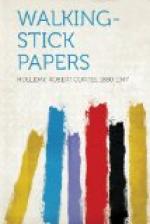When one enters upon his last role in this world, which all fill in their turn, he becomes in rural journals that personage known throughout the countryside as “the deceased.” It might be argued that, alas! the only thing you can do with one deceased is to bury him. It might be held that you cannot educate him. That he, the deceased, cannot enter upon the first steps of his career as a bookkeeper. That he cannot marry the daughter of the Governor of the State. That whatever happened to him, whatever he accomplished, enjoyed, endured, in his pilgrimage through this world he experienced before he became, as it is said, deceased. That, in short, he is now dead. And that it should be said of him, as we say in the Metropolitan press, as a young man Mr. Doe did this and later that. But in places simpler, and so more eloquent, than the Metropolis the final fact of one’s existence colours all the former things of his career. In country obituaries all that has been done was done by the deceased. In this association of ideas between the prime and the close of life is to be felt a sentiment which knits together each scene. This Mr. Some One did not merely apprentice himself to a printer at fourteen (as city papers say it) and marry at twenty-one. But he that is now deceased was once full of hope and strength (at fourteen), and in the brave days of twenty-one did he, that is now struck down, plight his troth. So, doubtless, runs the thought in that intimate phrase so dear to country papers, “the deceased.”
And there are no funerals in the country. That is a word, funeral, of too forbidding, ominous, a sound to be under the broad and open sky. There where the neighbours gather, all those who knew and loved the departed from a boy, the “last sad rites are read,” and the “mortuary services are performed.” Then from the fruitful valley where he dwelt after his fathers, and their fathers, he mounts again the old red hill, bird enchanted.
He is not buried, though he rests in the warm clasp of the caressing earth. Buried has an inhuman sound, as though a man were a bone. The deceased is always “interred,” or he may be “laid to rest,” or his “interment takes place.”
Now, it is in these biographical annals of small places that one finds the justest estimates of life. There folks are valued for what they are as well as for what they do. Inner worth is held in regard equally with the flash and glitter of what the great world calls success. I was reading just the other day of a late gentleman, “aged 61,” whose principal concern appeared to be devotion to his family. His filial feeling was indeed remarkable. It was told that “after the death of his parents, three years ago, he had resided with his sister.” After his attachment to his own people, his chief interest, apparently, was in the things of the mind, in literature. He had “never engaged in business,” it was said, but he “was a great




